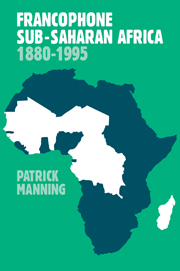Book contents
- Frontmatter
- Contents
- List of illustrations
- Acknowledgments
- Note on the second edition
- Map 1 Francophone sub-Saharan Africa in 1995
- 1 Prologue
- 2 Economy and society, 1880–1940
- 3 Government and politics, 1880–1940
- 4 Culture and religion, 1880–1940
- 5 Economy and society, 1940–1985
- 6 Government and politics, 1940–1985
- 7 Culture and religion, 1940–1985
- 8 Democracy and dependence, 1985–1995
- 9 Epilogue
- Bibliographical essay
- Index
8 - Democracy and dependence, 1985–1995
Published online by Cambridge University Press: 12 January 2010
- Frontmatter
- Contents
- List of illustrations
- Acknowledgments
- Note on the second edition
- Map 1 Francophone sub-Saharan Africa in 1995
- 1 Prologue
- 2 Economy and society, 1880–1940
- 3 Government and politics, 1880–1940
- 4 Culture and religion, 1880–1940
- 5 Economy and society, 1940–1985
- 6 Government and politics, 1940–1985
- 7 Culture and religion, 1940–1985
- 8 Democracy and dependence, 1985–1995
- 9 Epilogue
- Bibliographical essay
- Index
Summary
The seven previous chapters of this volume address African encounters with colonialism up to 1985. They narrate the creation of a modern African culture from the interplay of African cultural heritage and European colonial tradition. In turning now to the years after 1985, we find colonialism fading from its prior position as the dominant factor in African experience. To interpret recent years we must add a level of complexity, and address not only the creation but also the evolution of modern Africa. In its evolution, modern African culture draws on the contemporary influences of its own nascent traditions and on the global forces emanating from every continent, while continuing to draw on the historical influences of its African and colonial roots.
This interplay of factors yielded complex sources of change. By 1985, for instance, the leaders of African nations had exercised formal responsibility for nearly a generation, so that their own patterns and proclivities became factors in determining the African future, though the colonial heritage remained visible everywhere. New ethnic conflict burst forth in Burundi and Rwanda, while old rivalries separated ethnic groups in Senegal and Mauritania. The economic stagnation of the 1980s reflected the failures of African governments, both socialist and liberal in political persuasion, but also the failures of international organizations and great-power allies to bring relief to African economies. Even among global influences, it is useful to distinguish between the continuing heritage of colonialisms and newer global factors. The former included the special relationships between France, Belgium and African nations, and also the remnants of racism; the latter included the Cold War and its demise, global economic restructuring, democratization movements, and global cultural trends.
- Type
- Chapter
- Information
- Francophone Sub-Saharan Africa 1880–1995 , pp. 180 - 210Publisher: Cambridge University PressPrint publication year: 1999



